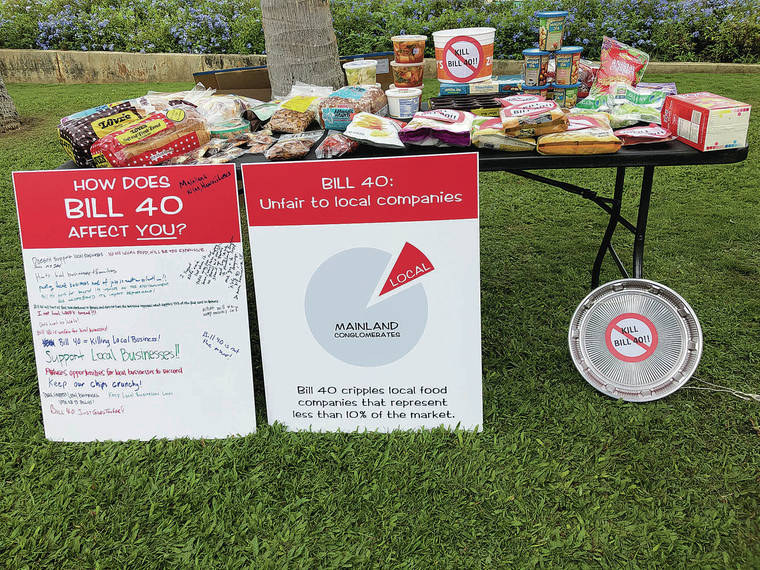Honolulu City Council members agreed to hold off a final vote on a controversial plastics ban bill and instead send the issue back to the Public Safety and Welfare Committee to address concerns raised by a large cross section of the local business community.
The promise by the Council members didn’t stop
approximately 200 Bill 40 Opens in a new tab
opponents — led by a who’s who of retail and wholesale business leaders — from gathering in front of Honolulu Hale on Tuesday to express their displeasure at what they believe is a poorly crafted measure that jeopardizes their future.
Councilman Joey Manahan, the bill’s author, said the legislation’s goal is to prohibit the use of single-
use plastics, not ban all plastic food packing for food processed in Hawaii, as has been suggested by some opponents.
But the latest draft of the bill was “a little bit broad and vague,” he said. “I can understand a lot of the apprehension that was coming from the food industry.”
Manahan and Councilman Tommy Waters, who heads the Public Safety and Welfare Committee, said they are meeting with industry leaders to find ways to address their concerns.
The two met with Jason Higa, president and CEO of Zippy’s parent company, FCH Enterprises, and Foodland Chairwoman and CEO Jenai Wall, as recently as Monday, Manahan said.
The major concerns raised by the businesses
involve the seemingly wide breadth of the latest draft and the timeline for implementation. The groups said the latest draft changed the definition of “plastic” to mean “any material made of fossil-fuel derived or petrochemical polymeric compounds and additives that can be shaped by flow.”
At the rally, the opponents put out a table of packaged goods they believe would be prohibited from being sold. The offerings included typical Hawaii kitchen staples Mauna Loa macadamia nuts, Diamond Bakery animal crackers, Halm’s Enterprises kim chee, Love’s bread and Meadow Gold POG (passion-
orange-guava) drink cartons.
“It affects all Hawaii businesses, all manufacturers,” Higa said. The bill, in its
current form, would allow companies to apply for exemptions based on “undue hardship.”
Mike Irish, owner of Halm’s Enterprises, which also owns Keoki’s Laulau and other packaged products, said the bill is simply badly written and in need of clarification.
“The bill is just not done the right way,” Irish said. “What we’re trying to do is kill the bill or move it into next year when we can sit down and talk about it.”
Local businesses learned about the potential impacts so recently that the coalition that gathered Tuesday had yet to find a name for itself. “Maybe we use ‘Kill Bill 40’ as our coalition name.”
Higa estimated that 80% to 90% of the plastic products used would be eligible for exemptions. But exemptions create uncertainty, and “businesses cannot operate, cannot reinvest, because you never know when your exemption might be taken away,” Higa said. “And how long is it going to take to process thousands of exemptions?”
The worst thing about the bill is that it only applies to local businesses because federal interstate commerce laws prohibit a state or municipality from passing laws that impede interstate commerce, Higa said. “You cannot stop plastics from coming into the county,” he said.
Waters said he expects the latest draft will remove most, if not all, of the items he saw on the table put out by bill opponents.
“We want to protect Love’s Bakery, Diamond Bakery,” Waters said. “We want to make sure they can still do business.”
Manahan said he expects most prepackaged items to be allowed and therefore not required to have individual exemptions.
Despite their willingness to work out a compromise with the businesses, both Waters and Manahan said they also believe it’s time for Hawaii residents and businesses to accept that the environmental challenges caused by climate change, global warming and sea-level rise demand dramatic changes in lifestyle that can’t be put off much longer.
Mayor Kirk Caldwell, who was with Manahan at an unrelated news conference, said he supports Bill 40 but wants to address the concerns raised by the businesses. “We’re trying to see where we can find a balance … but we need to start, we need to make a significant difference.”

